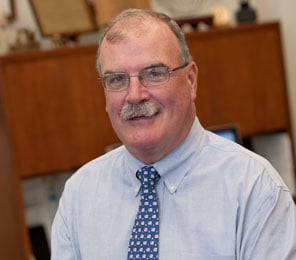 |
|
| John L. Sullivan, MD | |
After a career of scientific, academic and institutional leadership that is as historic as it is substantive, John L. Sullivan, MD, vice provost for research, professor of pediatrics and molecular medicine and the inaugural recipient of the Chancellor’s Medal for Distinguished Service, will retire at the end of June, Chancellor Michael F. Collins has announced.
“John Sullivan’s accomplishments at UMass Medical School and UMass Memorial as a teacher, clinician, scientist, researcher, mentor and administrator have helped make this institution nationally and internationally known,” said Chancellor Collins.
Dr. Sullivan, who joined UMMS in 1978, most recently had a leadership role in attaining a Clinical and Translational Science Award from the National Institutes for Health; however, his scientific work as an internationally recognized viral immunologist who focused on the molecular components of HIV, beginning in the years when the virus was first being identified, was groundbreaking.
Active in HIV/AIDS study and treatment since tracking of the disease began in 1981, Sullivan and his colleagues played a key role in understanding how the immune system interacted with HIV. By studying two distinct populations—adults with hemophilia and infants—his lab found that the difference in how HIV manifests itself in children and in adults was not only crucial, but in fact held a key to understanding the disease. Along with his longtime colleague and collaborator Katherine Ruiz De Luzuriaga, MD, professor of medicine and pediatrics, Sullivan was instrumental in the discovery of the anti-retroviral drug nevirapine in 1989; it was at UMMS that nevirapine was first given to adults and children with HIV infection two years later.
“That the current generation of medical students and physicians are able to see HIV/AIDS as a treatable, chronic disease is due in part to the work of John Sullivan,” said Terence R. Flotte, MD, executive deputy chancellor, provost and dean of the school of medicine.
In 1999, Sullivan was appointed director of the Office of Research. In this position, he has endeavored to elevate the Medical School’s basic science and clinical research enterprise to national and international prominence, exemplified by recognition such as the Nobel Prize in Medicine won by his colleague Craig C. Mello, PhD, Howard Hughes Medical Institute Investigator, the Blais University Chair in Molecular Medicine and distinguished professor of molecular medicine and cell biology.
In recognition of Sullivan’s work, he was selected in 2003 to receive the Manuel Carballo Governor’s Award for Excellence in Public Service for his role as “an internationally renowned scientist, accomplished educator, compassionate physician and competent administrator.” Named for the formersecretary of human services, the Carballo award was given annually to 10 state workers who exemplified the highest standards of public service through exceptional accomplishment, superior leadership, creativity and productivity.
“John’s retirement will impact UMMS research and administrative enterprises in several ways,” said Dr. Flotte. “Dr. Luzuriaga will take over as the principal investigator on the CTSA and as director of the UMass Center for Clinical and Translational Science; and we will undertake a search for an executive vice chancellor for research, reporting to the chancellor.”
Sullivan has agreed to stay on as vice provost on a part-time basis over the course of the next year, focusing on the transition of CTSA leadership and the move of faculty into the Sherman Center.
“Over the course of the last 34 years, John Sullivan has played an influential—indeed, formative—role in many of our most significant accomplishments,” said Collins. “While I know you all join me in wishing him the serenity of a well-deserved retirement from his full time role, I also know you will join me in acknowledging the many important contributions of our valued and treasured colleague.”